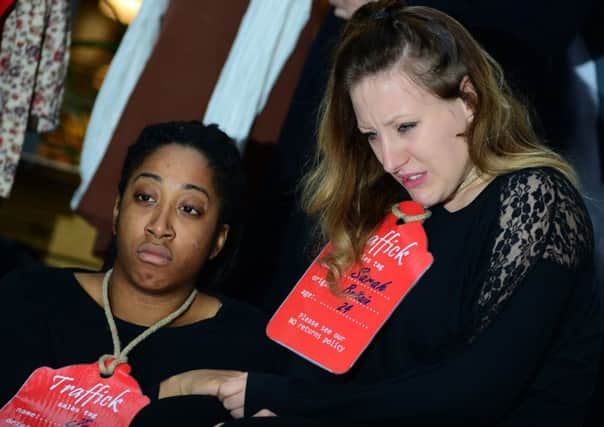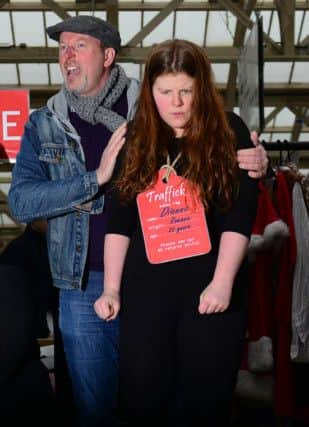The modern-day slaves under our noses, here in Yorkshire


A human trafficking expert at the Salvation Army says victims of exploitation could be “washing our cars, paving our driveways or doing our manicures” having been forced to work for a pittance by criminal gangs.
Today the charity joined forces with students from the Performing Arts Department at The Sheffield College to stage a dramatic representation at Sheffield station of a market stall selling people as commodities.
Advertisement
Hide AdAdvertisement
Hide AdIt says dozens of victims every year are being referred to its staff for help from around the region and hopes to raise awareness about the problem among “the large numbers of people who still don’t know about the appalling crime of human trafficking”.


Earlier this summer, The Yorkshire Post warned that victims of human trafficking and forced labour are going undetected across Yorkshire as members of the public and local authorities fail to recognise the problem going on in front of them.
Major Anne Read, the Salvation Army’s anti human trafficking response co-ordinator said it was vital people reported their concerns about suspicious behaviour as the victims are often “hiding in plain sight”.
She said: “It is happening all around us, this year there has been a 62 per cent increase in referrals but also more cases of labour exploitation.
Advertisement
Hide AdAdvertisement
Hide Ad“Very often these people are under our noses, they are washing our cars, they are paving our driveways and doing our manicures.
“We are using this as an opportunity to say to people ‘don’t mind your own business, make it your business’.
“People might think someone looks frightened or looks injured, that something doesn’t look quite right but have not done anything about it. You just need to see something that makes you feel uncomfortable and say ‘I am going to do something about it’.
“I am hearing more and more of individuals who are saying something and making a call, and I haven’t heard of a situation yet where that has been unhelpful.
Advertisement
Hide AdAdvertisement
Hide Ad“If there is nothing going on, then there is nothing lost, but if there is something going on, this might stop it in its tracks, which is a great thing.”
The Salvation Army was appointed in July 2011 by the Home Office and the Ministry of Justice to provide support services to adult victims of human trafficking in England and Wales.
In three years The Salvation Army and its partners have supported more than 1,800 victims of human trafficking but the charity, which has a number of bases in Yorkshire, says more are being referred each year.
Nearly a third of its referrals come from the South East, but Yorkshire is said to be a ‘hotspot’ for reports of trafficking and was responsible for 16.3 per cent of its demand last year.
Advertisement
Hide AdAdvertisement
Hide AdMajor Read said: “One of the things in Yorkshire is that we have responsive police forces. The UK Human Trafficking Centre started in Yorkshire, maybe the area is ahead of the game in recognising this as an issue and responding to it.
“It is also to do with having a large population and its infrastructure. Having main motorways going right through the region north, south, east and west, that is also a factor. But a positive possibility is that Yorkshire is good at recognising victims and referring them.”
Earlier this year, a leading academic told The Yorkshire Post that official statistics about the numbers of people forced into miserable working conditions or trafficked into the country to be exploited in the region “hugely understate the scale of the problem”.
It is feared many victims are being put into slavery, forced labour and sexual exploitation in rural North and East Yorkshire, where the number of remote locations make it easier to hide from the authorities.
Advertisement
Hide AdAdvertisement
Hide AdIn parts of Yorkshire, victims are kept behind closed doors in brothels or cannabis farms, but could also be seen working in nail bars or at car washes.
Human trafficking is said to be the fastest growing crime type in the world, and 566 victims were referred to the Government between January and March nationwide, including one woman trafficked for ‘organ harvesting’.
At today’s event in Sheffield, information was given to passers-by on how to spot the signs that someone is being trafficked and what they can do to help. Anti-Slavery Day is on October 18.